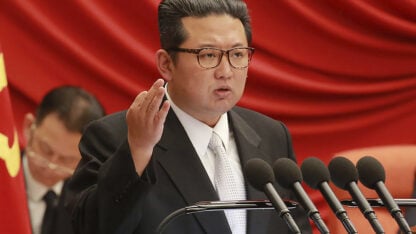Atlanta Mayor Keisha Lance Bottoms said Friday she has wrestled since her first year in office with whether to seek a second term, and this week she made a final decision to step aside even as she insisted she doesn’t know what she’ll do next.
“Leadership sometimes is about passing off the baton,” Bottoms told reporters at City Hall, the morning after releasing an election-year surprise public letter and video announcing that she wouldn’t run for re-election this year.
It was a stunning announcement for the 51-year-old politician who is just the second Black woman to lead Atlanta and who less than a year ago was among the women President Joe Biden considered as a possible running mate.
Bottoms called it a decision rooted in her faith, and pushed back at any notion that she is afraid of a bruising campaign. She noted she’s built a flush campaign account — with Biden’s help — and maintains a strong standing with the electorate, even as she navigates a sometimes rocky relationship with the City Council and with her one-time ally and political benefactor, former Mayor Kasim Reed.
“There is a divine voice that lives inside each of us … and it may not make sense to anyone else, but when you know what you know, it becomes less and less important what other people think,” Bottoms said, adding that she considered the matter as early as the opening months of her administration.
The mayor emphasized she will finish out her term, which runs through early January 2022.
She did not rule out a future post in Biden’s administration.
“We’ll see. I can tell you being mayor with President Biden in the White House has made a world of difference,” said Bottoms, one of Biden’s earliest endorsers in a crowded Democratic primary campaign.
Bottoms said donors to her reelection account will receive a letter offering to refund their contributions. While Bottoms said she has no plans to “anoint a successor,” she said she’ll “make it known at the appropriate time who I will cast my vote for.”
The City Council president, Felicia Moore, has announced her candidacy. Some political observers believe Reed, who endorsed Bottoms in her 2017 mayoral bid, is angling for a potential return, as well, after being dogged for years by a federal investigation into city contracts and finances during his administration.
Signaling a falling out with Reed, Bottoms pledged not to interfere with her successor. “Unfortunately, that hasn’t been the case, always, during my term,” she said.
The mayor also lamented the federal investigation that she said sometimes “sucked the life out of City Hall.”
Bottoms’ tenure has been a mix of rough-and-tumble City Hall politics and an ever-brightening national spotlight for her beyond the city.
She frequently traveled and appeared on national television to campaign for Biden. He later considered her for the vice presidency, though he eventually chose Kamala Harris, who is now the first woman to hold the national office.
Bottoms’ profile rose during the coronavirus pandemic and with the renewed attention on policing in the United States after George Floyd’s killing by a white Minneapolis officer last spring.
She drew plaudits for a nationally televised news conference in which she chided protesters to “go home” while sharing her own experiences as a mother of Black sons to empathize with citizens distraught over police violence. She pledged to review Atlanta’s police procedures in the wake of Floyd’s killing.
Yet Bottoms met criticism herself just weeks later when an Atlanta police officer shot and killed Rayshard Brooks. The officer, Garrett Rolfe, was fired last June, a day after he shot the Black man in the parking lot of a fast food restaurant. Rolfe was later charged with murder.
The Atlanta Civil Service Board on Wednesday reversed the firing, finding the city failed to grant Rolfe due process. Bottoms said then that Rolfe would remain on administrative leave while criminal charges against him are resolved.
The mayor did not mention Floyd or Brooks in her announcement letter, focusing instead on having given the city’s police and firefighters raises and alluding to a “social justice movement (that) took over our streets … and we persisted.”
Early in her term, Bottoms eliminated cash bail in Atlanta and ended the city jail’s relationship with federal immigration enforcement agencies, joining big-city mayors around the country in criticizing then-President Donald Trump’s hardline immigration policies. Her administration navigated a cyberattack on the city’s computer systems early in her tenure.
She helped renegotiate the long-term redevelopment of “The Gulch,” part of the city’s old railroad footprint downtown. But the city did not score the biggest potential prize for the location: the second Amazon headquarters that instead is being built in northern Virginia, outside Washington, D.C.
An Atlanta native and graduate of Florida A&M University, a prominent historically Black college, Bottoms is just the second Black woman to lead the city. She joined Shirley Franklin, who served two terms from 2002-2010. Bottoms noted her family’s deep ties to the city and surrounding region whose history traces Black America’s arc from slavery and Jim Crow segregation to the ongoing legacy of institutional racism.
“My ancestors, direct descendants of the once enslaved, traveled by horse and buggy from the cotton fields of east Georgia in search of a better life for themselves and their children in Atlanta,” she wrote in her open letter Thursday. “I have carried their belief for a better tomorrow in my heart, their earnest work ethic in my being, and their hopes for generations not yet born on my mind, each day that I have been privileged to serve.”









